Myth Busting: Are Video Embeds an SEO Ranking Factor?

One aspect of SEO that has been growing in popularity is the use of videos. Many people – a lot of people – seem to think that video will be the wave of the future and that text content is dead. People spend hundreds of hours on sites like YouTube and TikTok, but how much time do they spend reading blog posts? They say less than ever since so many people share posts based on their video title, video description, and thumbnail; they might not even click through to read it in the first place.
For one, I blame social media for that. Social media has done a lot to destroy our attention spans, collectively, and push us towards a constant flow of New Fresh Content, regardless of whether or not that's what we want or would benefit from having.
Videos are undeniably important, but they also have a high barrier to entry. Sure, anyone can spend some money on Fiverr to get an animated explainer or record with their webcam, but how many people watch those? Pretty much no one. There's so much good video content out there that even if you're producing video, you're not getting much out of it unless you're good at it.
That's all personal opinion and conjecture, though. The question is, does using video boost your SEO? Let's look a little deeper.
Video as an SEO Factor
Is video directly a direct SEO factor? No.
Alright, let's move on.
Wait, you want more? Alright. Videos don't directly improve the SEO of a web page. However, they can help you in two ways: video SEO and video search engine results. They can also hurt your site in a few ways, which I'll get to later.
Google does not say anything in their help center about videos being an organic SEO factor in their algorithm. Pages with video on them are not given any inherent boost over others, and Google only has pages about video SEO itself, for example.
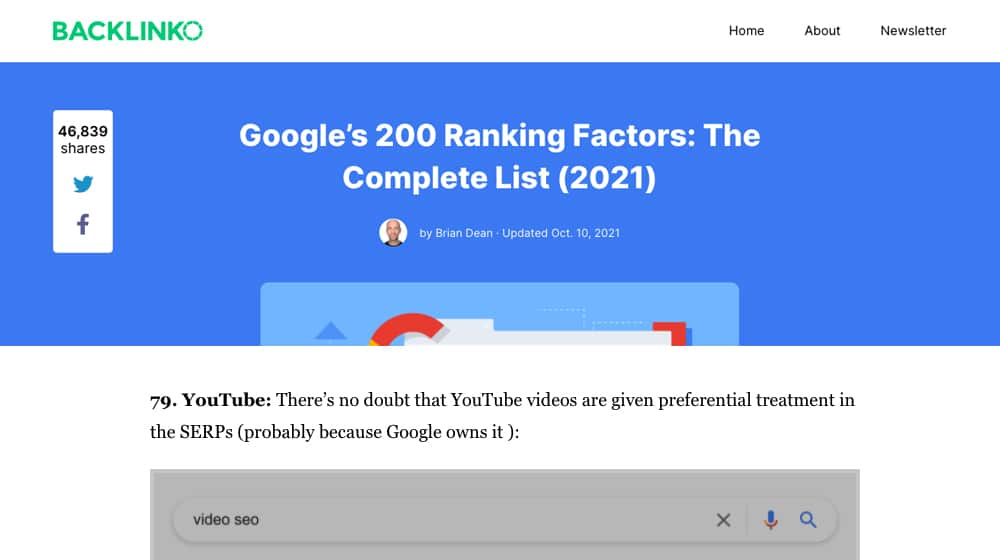
Backlinko, in their complete guide to Google SEO ranking factors, only mentions video in passing.
"42. Multimedia: Images, videos, and other multimedia elements may act as a content quality signal.
79. YouTube: There's no doubt that YouTube videos are given preferential treatment in the SERPs (probably because Google owns it)."
Video indeed shows up in the SERPs with relative frequency. The thing is, it doesn't really help, and the data it adds might not even be relevant. Here's an example from a site I know:
This food blog embedded videos of a recipe that they reviewed. Google Search pulled data from the video to use in their SERPs: the publisher of the video. That information is given prominence, above and beyond the actual blog's branding. Now, if they had rehosted the video, they would be able to get that attribution, but then they're stealing content. Not great either way!
Anyone looking for that Food Wishes recipe will find it first on AllRecipes (homepage of Food Wishes), and the Food Wishes YouTube channel first. This blog will show up for these searches and all of the other websites that review the same recipe.

Still, a site having attribution for a different website entirely embedded in their SERPs isn't all that great. That said, if you're the one producing the video, well, that's another story. That attribution is yours. But does it help directly in SEO terms? Probably not. The site is probably not going to rank higher with a video than it would without, solely because of the presence of the video. That said, it can be pretty hard to test due to what I'm about to cover.
Secondary SEO Benefits from Video
Video may not directly benefit SEO, but it does have a handful of secondary benefits that can help SEO in various ways.
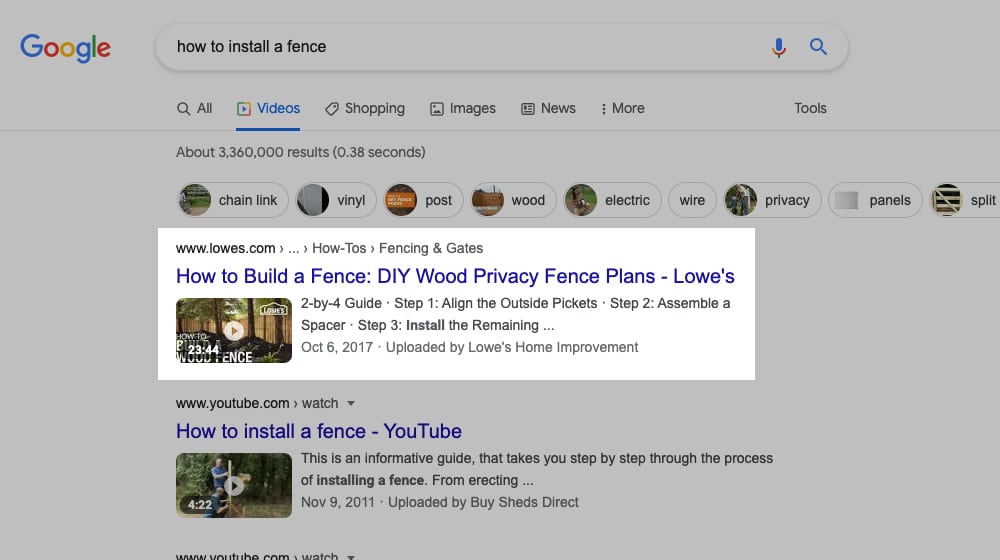
There are a handful of different ways the presence and optimization of a video can increase the visibility of a site.
- Thumbnails in SERPs. Sometimes, videos have thumbnail data, which is scraped and used as a picture in the search results. In the screenshot example above, the picture isn't from the video; it's the featured image for the blog post. However, the video thumbnail is used instead for other cases where the video is directly used for the search result.
- Attribution in SERPs. The video creator attribution metadata is used in SERPs whenever a video is present. If this is yours, on your blog, it's bonus attribution that makes your search result stand out from the rest, even if it's only a little bit. Of course, if you're embedding someone else's video – which can be common for reviews or responses – that person gets attribution on your search result.
- Video results box. Many queries where a video is a direct relevant result will have a box at the top with 3-5 video results and the option to browse only video results. This box shows both sites that host videos and sites that embed them. However, I question the value of this; the top results are 100% always going to be the original site hosting it, YouTube, Reddit, and other major sites; if you're small enough to care about the small boost video gives you, you're too small to rank well in this box.
- Traffic from YouTube. A video hosted on YouTube gets its traffic, some of which might migrate to your website. It's a secondary benefit, but referral traffic is referral traffic, and that's always good to have. Even if videos don't improve your Google traffic, videos rank independently on YouTube search and could be a brand new source of traffic for you. Related videos from similar channels can also drive traffic to your brand.
- Dwell time. Google claims they ignore dwell time, but I don't quite believe them. They say it's because they can't measure it accurately, especially for single-page visits, but let's be honest: almost every web browser today, including Firefox and Edge, is powered by Chromium. Google has access to that data if they want it. I wouldn't be surprised if they used this information in some capacity, but that's a theory, not a definitive case study.
- Rich Data. Videos offer additional opportunities for schema.org markup. I've written before about how valuable Schema markup is.
- Indirect Benefits. Some of these factors are difficult or impossible to measure. For example, it just may be that your video embeds make your content more shareable, resulting in more people linking to your content. Quality links would certainly help your SEO, but it isn't easy to button down your videos as the definitive reason for those extra backlinks.
All of these are secondary benefits, but after all, what is SEO if not an accumulation of secondary benefits being rolled into primary factors?
I believe that videos will help boost your website and page SEO through these secondary metrics, but only if you can get rid of the potential issues that come from using them.
Potential Video SEO Problems
Video can hurt your site just as much as it can help, just in different ways. Again, these tend to be indirect.
1. They can slow down your site speed and load times.
Site speed and page load times are some of the most important modern metrics in SEO. I've found it to be very beneficial to get my site loading quickly, and video is challenging to implement correctly. You have to defer loading the video carefully, load an image screenshot (properly compressed) as a placeholder to avoid contentful paint problems, and even then, you could end up taking a hit to your speed rankings. It's very tricky to use video without slowing your site, and it's made even more complicated when you have to rely on a site like YouTube not suddenly changing the way they function out of nowhere.
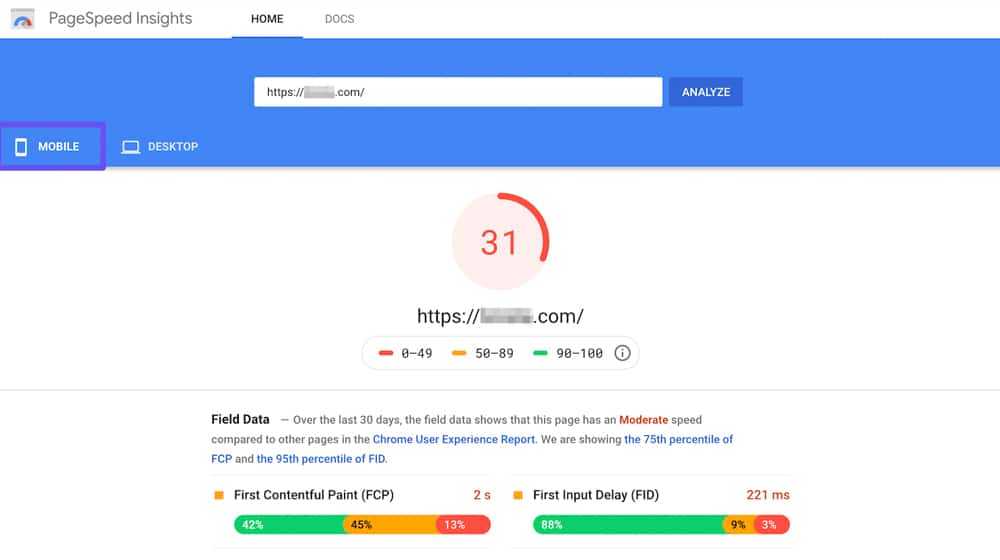
The differences in speed will be different between Vimeo and YouTube, and whether or not you're using optimization plugins, dedicated video hosting, or a CDN.
Here's an example of a blog post I wrote that uses some of these techniques. This article has 29 video embeds on it from YouTube, but it still scores in the high 90's on Google PageSpeed Insights. As long as your video embeds are properly optimized, they shouldn't hurt your search engine optimization efforts. WordPress makes this a bit easier, but there are plenty of tutorials for small businesses that are using various content management systems.
2. Your blog fails to have worthwhile content surrounding the video.
If your landing page is 90% video, that's fine - if users are aware of that. If they aren't, though, there are plenty of people who want to read their content. Moreover, a page with 300 words and a video might come across as thin content, depending on how Google counts the video.

It's tricky because it might be better or it might not, and a lot of it depends on the context of the post and the intent of the people coming to visit it.
3. Autoplay videos increase bounce rate and reduce dwell time.
No one likes autoplay, and yet it's still widely in use. Google doesn't seem to penalize it directly, but a lot of users sure will. I know most people I talk to will leave a page if an autoplay video – especially one with sound – and that forces bounce rate through the roof, kills dwell time, and generally makes your page much less attractive to users.
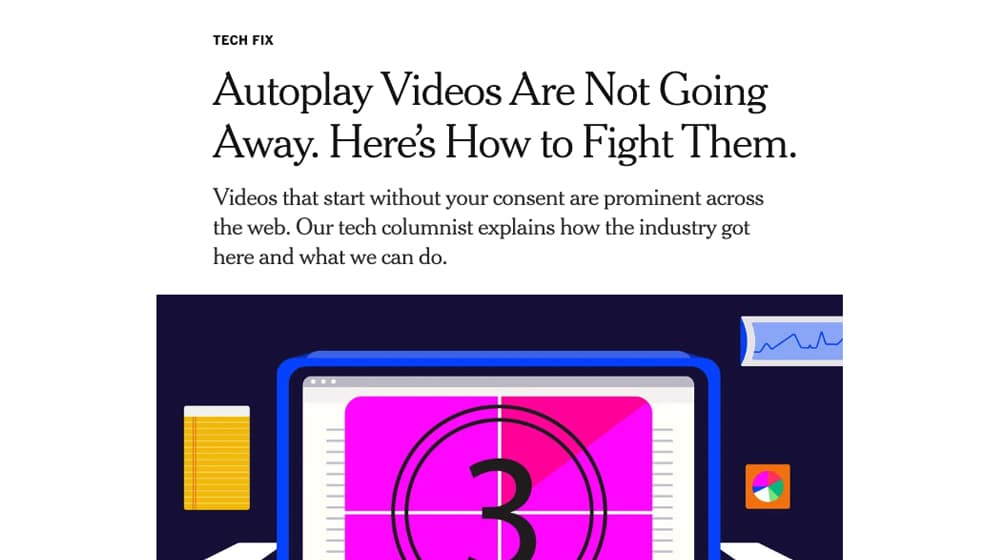
A poor or disruptive user experience can have a suppressive effect on your search ranking.
4. Videos can present a potential accessibility problem.
I'll quote what I wrote over here for this one:
"Videos have accessibility issues. If a lot of your video focuses on the visuals, visually impaired people will have trouble consuming them. If your videos focus on the audio, anyone with impaired hearing will have trouble. More importantly, millions of people watch videos in public places that don't want to turn up the audio. Hell, Facebook even starts their videos muted. You always have to be aware that your video may only be consumed partially, and it still has to function in that mode of consumption."
5. Some users don't or can't watch videos.
Let's say you're doing some research on a subject. You're on your commute to work and browsing on your phone. Can you watch a video? Maybe, but probably not. You might not have headphones and can't listen to them. Or, conversely, you can listen to a video while driving but can't take your eyes off the road to read the text the video relies on.
Video can also take longer to consume than written text and is harder to browse to find what you might want in it. With a blog post, you can browse subheadings or a table of contents or do a ctrl-F and search for a keyword. With a video, you have to hope they either have timestamps or click to the right spot if there is a right spot.
The point is that videos have issues, and you have to work around those issues and hope the value you get from the video is more than the detriment you suffer from relying on it.
Should You Invest in Video?
The question is, after all of this, is video marketing worth investing in for your content marketing? I say the answer is a resounding "maybe."
It all depends on the potential value you can get from video versus the sacrifices and investment you need to make to produce it.
Low-quality videos suck and will hurt you more than they help. It's very, very easy to start up a YouTube channel and create basic videos, and those videos will do approximately nothing at all. It would be best if you put a lot of effort into it, and you can't just sit in front of a webcam and read a blog post as a script. Video writing is very different from blog writing.
Producing a high-quality video requires a lot of talent and a lot of time to learn and produce. Skilled video editors exist, but they're going to charge money for their services, which is yet more of an investment.
On top of all of that, you have to implement a video SEO strategy properly. That means video SEO where you upload it – which will be YouTube, let's be honest here – and video SEO on your site where you embed it. YouTube SEO is a totally different animal, with transcripts and keywords and descriptions and thumbnails, and that's a whole new skill set to learn. Then, you need to embed properly on your site, use the right metadata, add rich markup, and more.
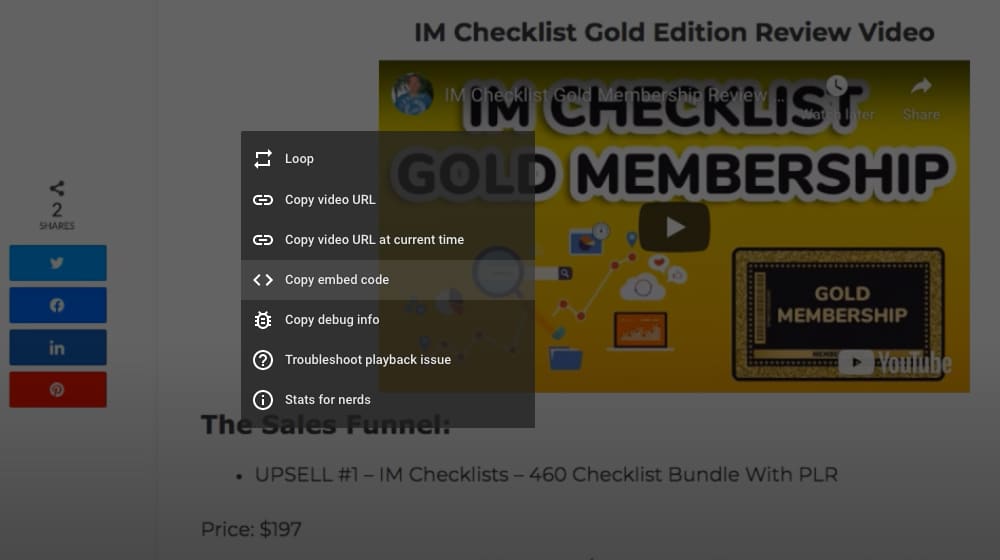
So you have to ask yourself:
- Can you produce a video that is high enough quality to drive traffic, increase conversions, and add value to your marketing strategy?
- Can you do it in a way that offsets the potential issues and audience alienation you can see if you rely too heavily on video?
- Can you take those video-invested users and convert them into regular readers or customers?
- Is it worth it?
It's a lot to consider in a complex situation.
Please make no mistake: video can be excellent and valuable in its own way. It's just not a slam dunk "add a video, and your SEO skyrockets" the way some people (mainly video SEO services) like to claim. You have to make a conscious decision to put effort into learning and using video, and that's not for everyone.










December 30, 2021
This is a very interesting topic. As a reader, I personally don't care for videos in blogs so I never thought of using them as a writer. If I wanted videos, I would go straight to video streaming platforms like Youtube. And you're right, the autoplay stuff just makes me want to look for another article because autoplay videos like that always seemed like irrelevant ads to me.
December 31, 2021
Hey Tom!
Admittedly I don't use videos too much either, but occasionally there is an article where it's natural to embed one, especially if I'm already mentioning it in the article.
It's probably not a good idea to force them (and especially to make them autoplay), but they have their time and place.